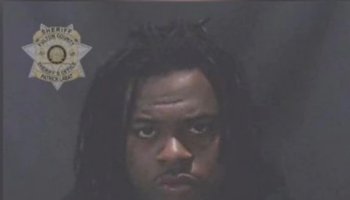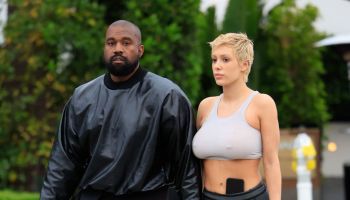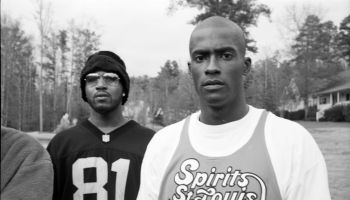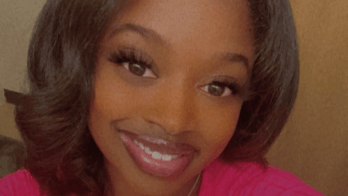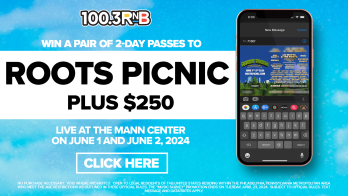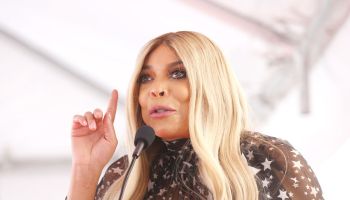We are just a couple weeks away from 6th annual Budweiser Made In America festival in Philadelphia and we thought you’d want to know about what’s going on. September 2-3rd the Ben Franklin Parkway will be filled with a hot lineup of artists including Jay-Z performing his new album, J. Cole, The Chainsmokers and more. The proceeds from this festival will be benefiting Philadelphia communities via United Way of Greater Philadelphia and Southern New Jersey and the American Civil Liberties Union of Philadelphia (ACLU).
Made In America recently published an article stating, “As a result of this concert, money invested into these communities will positively impact the education, income and health of the most vulnerable citizens in these regions.”
For almost 100 years, ACLU has fought to protect our nation’s rights and liberties that were guaranteed to us in the constitution – Philly Speaks sat down with the organization to learn more and discuss their new partnership with the festival.
Interviewer: Tiffanie Stanard, Philly Speaks Host/Producer
Guest: Reginald (Reggie) Shuford, Executive Director – ACLU of Pennsylvania
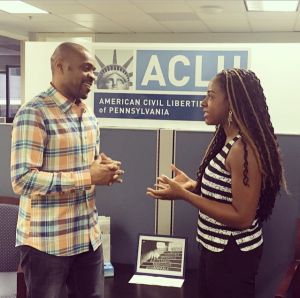
Source: Philly Speaks
Tiffanie: Tell us who you are and tell us about ACLU for the people who do not know.
Reggie: My name is Reggie Shuford. I am the executive director of the ACLU of Pennsylvania. There is one of me in every state across the country. The national ACLU is… primarily headquartered in New York City. It’s an almost 100 years old organization it’s one hundredth anniversary will be in 2020. I’ve worked with the organization for over twenty years. I was a litigator in the national office in New York City for 15 years. I’ve been here, it’ll be six years as executive director next month. The ACLU really works on protecting people’s civil and constitutional rights. The whole kind of laundry list of rights that we have come to… expect as Americans that constantly are in jeopardy at the national level, at the state level, and at the local level. We have some priorities that we’re working on here in Pennsylvania including: criminal justice reform, LGBT equality, voting rights, immigrants rights, and reproductive rights. Our core priority over the past couple years has been criminal justice reform and that’s pretty much a nation wide priority as well not just in Pennsylvania.
Tiffanie: You mentioned when I first got here that there have been some interesting folks coming to the office. Can you tell me about that and why people would show up to an ACLU office? How is it dealt with locally and nationally? – and if you’re not necessarily able to interact with people because of possible disagreements – How do you continue to interact?
Reggie: The interesting thing is that the more our name is in the press the more people seek us out. And usually that’s for a really good reason, right? They want to hear about the work that we do they wanna support the work that we do and- but because of the volume of that outreach we have to have a very kind of streamlined approach to respond. We encourage people to go on our website to reach out to us, we have a public number that we make available to people to contact us. And you know occasionally there are folks who want to reach out to us because they disagree with us or because you know they may have emotional or mental issues that they think the ACLU can help them with and in reality we most often- we can not. There are many ways for people to be in touch with the ACLU but because of the volume of that outreach we have to kind of have to manage that to the best of our ability and there are some people who kind of get through the cracks and end up showing up at our front door without having scheduled or arranged in advance – without an appointment. We do our best to talk to everybody who we encounter and sometimes that’s more difficult than other times. But we respond to everybody essentially.
Tiffanie: Does that mean especially with- as you mentioned being in the news more. Does that mean that you and your staff have to increase security? Or kind of figure out ways to make sure you’re safe but still helping people and engaging with people?
Reggie: Yes our security is an ongoing issue for us that we are as we speak in the process of still trying to develop practices and protocol that will enhance our physical safety but also our digital safety and security. And I know that, that is not just the conversation that is happening in Pennsylvania but again all across the country including our national headquarters. It’s scary and it’s real!
Tiffanie: With everything that’s happening in the news and constant headlines on local and national fronts. How does ACLU determine what to focus on? When there are many topics from healthcare, immigration and more?
Reggie: That’s a really good question and it’s a struggle. Because we are a multi-issue organization. Like I said the constitution really is the thing that kind of helps us figure out what it is we’re getting involved with and that is a big document. We have to have an ongoing conversation about what our resources allow us to prioritize and part of that will have to be what’s going on in our country. Like what’s going on in Philadelphia? What’s going on in Pennsylvania? What’s going on in Harrisburg? What are they doing in Harrisburg that we need to push back against- or support? And the conversation about criminal justice reform, for example, is one that is happening across the country. And we’ve been involved in that conversation for a long time. So, we don’t exist in an ivory tower but we engage at the local level – at the state level and at the federal level to help determine where we should deploy our resources. And part of that is strategic planning. Part of that is trying to anticipate what’s going on in our communities and where we need to have a presence. You name it but there are- these conversations are dynamic, they’re ongoing and our goal is always to be current. If not, in fact, to lead the charge and certainly to be relevant in those communities that are most impacted and in those communities that don’t often have the political voice to advocate most effectively on their own behalf. We always want to be in conversation, partnership and collaboration- impact individuals and communities, we want their voices to be uplifted and heard. So it’s the dynamic, ongoing, irritative process that helps us to determine where we want to deploy our resources.
Tiffanie: So how do you deal with the epidemic, as they say “fake news” when so many different things are in the media (especially with the President)? Good or bad “fake news” can move us away from real news and actual issues – it’s hard for regular citizens to know what is true or false. How does ACLU steer the conversation to what’s really important/ versus what somebody is just putting out there?
Reggie: Yeah it’s really interesting. Because with the advent of social media- everybody has a voice and everybody has a platform and so who do you listen to? It has many benefits that derive from social media there are many challenges. I think, what helps us is the fact that we are not new to this. We’ve been around for almost a hundred years and we have our priorities. We have our infrastructure, long standing members and new members. We have boards of directors that help guide the conversation and volunteers that help us accomplish what we need to accomplish. We’re an organization that has deep roots that help us remain grounded and so we don’t kind of sway with whichever way the wind is blowing.
Reggie: Sometimes we can get caught up in it too. Again we’re trying to be ahead of the curb and we’re trying to be relevant. But we know as a hundred year old institution that things are gonna come and they’re gonna go. And our presence, as an institution that is deeply rooted in the stuff that we’ve been doing for so long is gonna help us remain grounded.
Tiffanie: Do you consider yourself a content creator? As far as what you’re doing as a company to stay up to trend with millennials. Now you have more millennials that are interested in politics and civic engagement because of personally being affected by politics. Being a 100 year old company and working with different ages – How do you interact with those different age ranges when it comes to what they’re focused on as well?
Reggie: We definitely are content makers because we want to carry the message of civil rights and civil liberties and constitutional rights and we want people to know what those rights are and when they’re under attack and what they need to do to protect them. We’re always pushing out content that goes to those issues, right? And we have to use whatever mechanism and means are available to us to do that which includes web content and social media. We use every tool in our toolbox as a multi-strategy organization – a lot of people know it’s for the cases that we do. We do a lot of litigation but we also lobby. We’re in Harrisburg in terms of Pennsylvania lobbying on issues that are important to us but we are also trying to educate the public, again, on what’s happening out in the world and why their rights are important. How those rights may be under attack so that’s another strategy? And then we are also trying to mobilize people to act on their own behalfs, you know we are multi-strategic, multi-issue. Using whatever mechanisms we have to get the message out to people, to educate them, to mobilize them. Who will take advantage of those things and our membership as you’ve indicated runs a spectrum in terms of their interest, in terms of their demographics, in terms of their ages, you name it. And we have to try to develop the means of outreach to them that will be most effective and a lot of that is digital.
Reggie: We have a Mobile Justice app for example. We kind of created and developed with some of the younger folks in mind. But certainly you want everyone who has a smart phone to download it. Whatever we need to do to reach out to whichever constituency we want to reach out to we- we do that. We have in Philadelphia and in Pittsburgh where we have another office we have an office in Harrisburg too but we have a group of youngish professionals called, Young Leaders Outreach Team which are- which are doing a lot of work to carry forward our mission among younger people. We recognize that we needed to really really really be reaching out to younger folks to figure out how to do that but again the best messengers are younger people themselves so our Y.L.O.T. groups in Philadelphia and Pittsburgh are helping us to achieve that.
Tiffanie: Can you tell me more about the membership and what’s included and why should someone become a member?
Reggie: Thank you for asking that question! The membership gives you all of the content that the ACLU pushes out. Which is a lot… You’ll get a lot of online communication, you’ll get mailed stuff but it keeps you in the loop about what is going on in our- across the country, certainly in every state related to civil rights and civil liberties and constitutional issues. What you need to be paying attention – to how you can be mobilized… all of those things that’ll help you protect your rights and inexpensive it’s no more than $25 dollars a year or so. And what it allows us to do is to be a leader of resistance…People are looking at the ACLU now more than ever, we’ve been around for almost a hundred years but of late people are looking at the ACLU as leaders of the resistance. Not the sole leaders, because individuals and communities need to be linked in the resistance as well and we need to be able to resist. Which means we need people’s membership, we need their financial support, we need them to pay attention, we need them to be mobilized and activated, we need their like- we need their engagement. That’s why it’s important to become a member of the ACLU and it’s so easy to do, just go online aclupa.org and all of that stuff is readily- is readily available.
Tiffanie: How did the relationship start with ROC Nation?
Reggie: I’ve mentioned before that we, post election, have been like- our profile has really really increased a lot. And we came to the attention of ROC Nation particularly after the Oscars. We had those blue ACLU ribbons that a lot of celebrities were wearing, which was very exciting for us.
Reggie: And ROC Nation saw that and so they reached out to us with, they have their concert here in Philadelphia, annually. And they said they- we want to work with you to benefit the work that you’re doing. And so we’ve been having conversations with them since like April and it’s a big deal. Because some of the headliners include Jay-Z and other international but you know, as they want to put their money where their mouth is they want to certainly entertain. But they also are interested in social justice especially Jay-Z himself, he has been doing a lot of work on criminal justice reform, on bail reform, he was involved as a producer of the Kalief Browder documentary so this isn’t new to them. It’s what makes sense given our higher profile of late, given our criminal justice reform work, given their identical interest in our work it makes sense for us to collaborate. We were thrilled and excited to hear from them and are looking forward to the event actually happening in September, Labor Day weekend. And have about one hundred volunteers helping to staff the event across two days, we will have one or two leaders of the ACLU, meeting with ROC Nation while they are here and some of the celebrities, hopefully.
Tiffanie: Is this the first time this type of relationship has happened with ACLU – working with ROC Nation? Is this the first time you’ve had this type of partnership with an entertainment company?
Reggie: This is the first time that the ACLU of Pennsylvania has done that.
Reggie: There are 50 ACLU offices around the country so it’s possible that some of our colleagues in California or New York, at the national ACLU have had these kind of collaborations in the past. But this is our first time with somebody like ROC Nation for sure. But again, post election, and even though the ACLU is nonpartisan a lot of celebrities and other people have been wondering how they can get involved. And so they’ve reached out to us, we’ve reached out to them, they’ve been responsive and so we were hoping that it’s just the beginning of some longer term relationships and collaborations.
Tiffanie: You’re receiving parts of the proceeds from the event. What do you want to focus on? Would it be the people not prisons campaign, the criminal reform, or spread out amongst different programs? How do you see utilizing the funds from this event?
Reggie: Let me go back to your last question too, there’s a part that I left out. Our national office is also going to be taking part in Made In America. Including a Deputy Director of our Smart Justice campaign, his name is Bill Cobb. He happens to be from Philadelphia but works for the national ACLU, he’ll be locally involved in Made In America so there’s this collaboration with ROC Nation and the ACLU of Pennsylvania. But it’s also with the national office through Made In America. We will certainly use whatever proceeds we receive from the concert to benefit our smart justice, our criminal justice work but also whatever else we need to use it for. Because there are a lot of demands on many issues and, you know, will support the ACLU and we are careful to make sure we use that support strategically and smartly, but where we have to.
Tiffanie: United Way is another nonprofit partner that will be receiving proceeds and have been for the last five almost six years. Do you partner with nonprofits such as United Way and other nonprofits locally? Whether it’s events or just outreach?
Reggie: As much as we possibly can because we recognize that all nonprofits have limited resources. I acknowledge that but the beautiful thing about collaboration is that you bring your strengths to the table.
Reggie: Some other organizations, they bring their strengths and networks and connections and things so as much as possible we collaborate with other organizations. And specifically a goal of ours is to, as I said before, uplift impacted communities and organizations that are impacted. And so we want them to have an equal seat at the table and for their voices to be heard and these important conversations that are being had. The ACLU is not always the best messenger and sometimes, I mean, we get some baggage every time that we bring with us.
Tiffanie: As we close out the year soon there is a lot happening, locally and nationally. What do you think the community should focus on? Especially with local elections it’s been a lot locally from the DA’s and so on. We have local elections coming up in November. How do we continue to stay up to date and as you say, uplift and impact communities as we close out the year?
Reggie: Well I think the most important thing is engagement, period. Like local engagement, state engagement, national engagement but certainly be engaged in your communities. There’s a lot going on, you mentioned, the DA’s campaign, the primary election that was in May. So the ACLU of Pennsylvania was involved with some other nonprofit organizations in a campaign that sought to educate the general public on the role that’s the DA’s played in communities and gave them a lot of power.
Tiffanie: Philly Speaks listeners have been hearing about local races especially the DA race quite often from us.
Reggie: We had candidates forms but we also hired like about 50 folks to canvass. To go around, knock on doors to educate people about the campaign. And what I also love is those that talked early – directly affected people, like 90% of the people we hired are reformed citizens or folks that have some sort of contact with the criminal justice system who can speak first hand about their experiences in the criminal justice system. Which is, in my opinion, far more effective than someone who may be passionate about those issues be who doesn’t necessarily have a first hand experience like that. Be engaged with your the local issues that are going on, immigrants rights issues is a concern. Obviously, as I mention, criminal justice rights, voting rights, is you know- voting rights are always under attack. Particularly in the black community. We always had to fight for the right to vote and we always have to do that. Somebody, somewhere, is always trying to restrict the black vote. So folks should be engaged in that but definitely just be engaged. Like pay attention to what’s going on, take to the streets, be apart of the resistance. There are other people who are also a part of the resistance, join hands with them. They look like you, they don’t look like you- if you don’t think their issue is your issue, you find that they have a lot more in common and you don’t- transgender issues, LGBT rights, all of the above, as we speak are under attack. And we just need people to be engaged in the issues that most moves them… but also issues that impact their neighbors and their communities and their cities.
Tiffanie: As you mentioned when it comes to collaboration…Do you think that’s a good thing? Do you think more people should collaborate with the ACLU’s of the world versus, create? Because it’s been so much going on from the Science March, Women’s March, Immigrant March and they create nonprofits from that afterwards and it becomes all these different organizations. Which is great because everyone is activating and building something… but everyone is doing separate things. As well as going after the same resources – How do you bring it all together in order to actually have an impact?
Reggie: It’s a challenge and an opportunity. But generally speaking, I’m like the more the merrier, right? There’s a lot of work to be done and the people feel passionately. They want to take to the streets, by all means do it. That said, there are other organizations that may already be doing that, so learn who they are. Learn the organizations around you so that you can support them or create your own if you think there’s a need that’s being unmet. But you’re right – there’s competition for support, financial support, for membership and we don’t want to be duplicating or replicating the same issues. Be strategic about your engagement, particularly when it comes to creating another organization. They may not be necessary but if they are necessary make sure that the needs you’re filling is one where a need is being unmet.
Tiffanie: How do you feel about Aunty Maxine (Maxine Waters)? We’ve been talking about her a lot on Philly Speaks and been wanting her to come on the show but she’s been booked everywhere so we may not get her for another year. How do you feel about her and like other people that are really speaking out? Giving their truth on how they feel about the current president or just different issues.
Reggie: I love Auntie Maxine. As an organization, we (ACLU) are nonpartisan. As an individual, there are people who I love, there are some folks who I don’t care as much about. If I seem to say that a lot of what Maxine Waters cares about, I care about as an individual. But also organization- organizationally there is support for those individuals. When it comes to saving our democratic institutions, the integrity of our media, the integrity of voting, all of those things are under attack. And I don’t care if you’re republican, an independent, democrat, if you want to do what you can to preserve those institutions and speak out to support them, then you know I’m a fan. Maxine Waters, is one of those people who is doing that and more power to her.
Tiffanie: Final question – So we have so much going on with you know black lives matter and police brutality and voting rights and all that on one side. And then you have on the other side, music and black culture is now being celebrated with acknowledgment of black culture including the “Girls Trip” movie selling millions, and other black movies doing great. It’s like wonderful news for #blackgirlmagic and #fortheculture hashtags. The Ava DuVernay’s and the Oprah’s of the world are telling our stories, doing well and raising money. How do we bring that together to help the community or figure out solutions – maybe capitalize or use that entertainment popularity that we’ve should have always had to help and tell more stories on the other side?
Reggie: I think that is such a great point and I think, as I mentioned before, celebrities care a lot about- like Jay-Z has criminal justice reform for a long time, now bail reform and other things. And so it’s awesome when some celebrities use their platform on a socially conscious way and Ava DuVernay has been on that too, I mean she did, 13, that amazing documentary – about mass incarceration. John Legend has been doing a lot of great work. I think particularly people have been paying attention to the art that black people are putting out there and we can combine that art with social consciousness. It’s a beautiful thing and I think it’s an amazing moment and we want to encourage more of our black artists to get involved in these civil social justice issues and we applaud them when they do because it’s impactful.
Tiffanie: Thank you for your time.
Reggie: Sure, anytime – great interview!
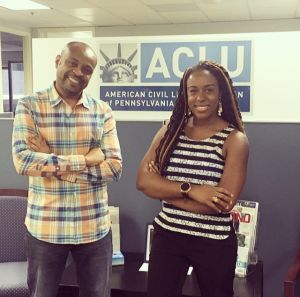
Source: Philly Speaks








